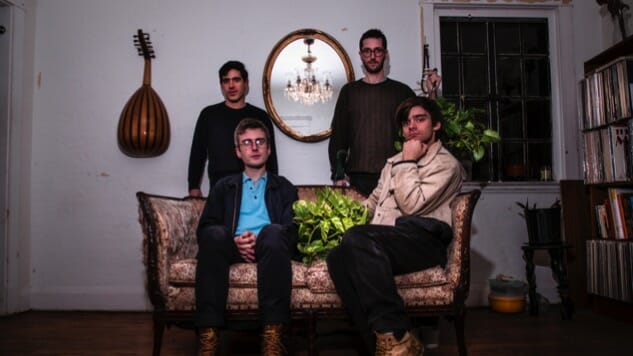
It’d almost be a stretch to connect old-time music, surf bands and the American strain of minimalism, but wrapped up in Horse Lords’ wiry, circular compositions is admiration for all the aforementioned noise and more.
A reference to the band, which recently issued its third full-length disc, Interventions, generally prompts a discussion of just intonation and a batch of heady conceptual topics touching on rock ‘n’ roll’s genome. Rightly so. But what occasionally gets glossed over is how powerful and entrancing the Baltimore ensemble’s groove is. Set up like a pretty traditional rock act, augmented by the accompaniment of a sax, the quartet insinuates sundry avant-influences, including guitarist Owen Gardner’s infatuation with African guitar styles. The admixture can be dizzying.
But there’s something at work on Interventions previously absent from the band’s 2012 self-titled effort, as well as on 2014’s Hidden Cities. The mechanical dance of “Toward the Omega Point” perhaps refines the Horse Lords’ aesthetic of repetition. It’s on the three “Interventions,” though, that the ensemble applies ideas previously relegated to its rockier moments to the realm of the utterly experimental—and as on the first interlude, the electronic.
The new disc’s out on Northern Spy Records, and the Baltimore troupe currently is on a North American tour, with a batch of European dates a possibility off into the future.
Paste: You’ve said that you’re influenced by African guitar styles. And I think you play the banjo, which is an African instrument. Have older banjo techniques worked their way into your playing as well?
Owen Gardner: The data are pretty cloudy, because there aren’t a lot of recordings of black banjo players, just because of, I guess, disinterest on the part of academics while that was an active part of African-American musical life. There’s not a ton of documentation in general about the practice. It would necessarily be a syncretic music…nobody can say, “Black American banjo music comes from this particular tradition.” It’s already a hybrid, so it’s complicated. There are definitely noticeable Africanisms in banjo technique even practiced by white players hundreds of years after it became an American instrument. But it does show up subconsciously in my guitar playing.
Paste: How’d you start playing banjo?
Gardner: That’s sort of what I grew up around. It’s not really a cultivated interest, it was just a part of my own musical background. My dad would play square dances and I would play with him. I watched competitions, but I never took part. I guess he entered some, but not really in that spirit. He was more a fiddler. He played guitar, too—all string-band instruments.
Paste: Wume, Zomes and Horse Lords are three Baltimore bands that share at least a little in common, but I can’t imagine that any of them define what the city’s music scene is most engaged with.
Gardner: I would not say that those three bands illustrate a trend particularly. I would say, the ground is shifting a bit or it has been recently. It seems like now there’s sort of more weird rap coming up, stuff that’s more plugged into club music. There’s been club music the whole time, but now I think people are coming at it more…I don’t totally understand it myself. There are people looking at rap and dance music from sort a not-mainstream standpoint—as noise.
As I’m getting older, maybe I’m feeling less plugged in—I still go to shows a lot; the narrative sort of eludes me. That doesn’t bother me particularly, that I don’t have my finger on the pulse. Maybe I do in another way.
Paste: Because of your band’s name, have you guys gotten a lot of attention from Lord of the Rings fans?
Gardner: We actually don’t get that half as much as we get people who are just into horses, which is pretty weird. I would say easily 10 percent of the people who follow us on Twitter are just horse enthusiasts, but don’t quite know what they’re signing up for.
Paste: That’s maybe an untapped market for Horse Lords.
Gardner: It’s true—an interesting crossover with [percussionist] Bob Nastanovich from Pavement. He’s a fan, but also a horse enthusiast. We were speculating that he was a crossover case, where he got into it because of horses, but realized that it was a band.
Paste: It seems that Horse Lords is set up like a rock band, but doesn’t really work within those terms.
Gardner: I think about the idea of rock music as an abstraction. [Horse Lords is] just vernacular music being updated through technology. It gives it more trance inducing potential, which is increased by the volume.
It was sort of an attempt to maybe deconstruct and reverse engineer rock ‘n’ roll itself—maybe like Afro-Appalachian music…All my words are failing me here. Just amplified, electrified vernacular minimalism.
Paste: The new album’s more stripped-down than the two previous full lengths. But there are also those “Interventions.”
Gardner: That’s an outgrowth of something we’ve been doing live. It’s a broadening of the aesthetic, sort of breaking out of the rock setting. None of us really listen to rock music—I’m at least not terribly interested in it. It’s a way of engaging us where we’re actually at. Andrew and Max both have solo records that are more like the “Interventions” on the album.
Paste: If they’re doing solo recordings and you have one in the works, is Horse Lords going to continue on the same trajectory or insinuate those other interests?
Gardner: I never even really thought about it; it’s possible. We’ll certainly maintain our own interests and the balance of the band will probably broaden. But we might incorporate more of those sorts of gestures and that kind of aesthetic. Live, we do something similar to what’s on the record. Folding it back into the group dynamic is not easy. That’s a challenge we’re still playing with, trying to figure out how to open it up a little more.